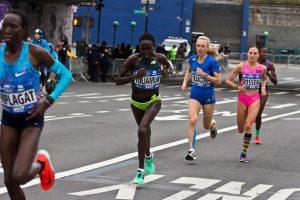 The media coverage of the recent Tokyo Olympics Games has featured a number of “Olympian-mother success stories,” reports Lindsay Crouse of the New York Times. Crouse notes a few examples:
The media coverage of the recent Tokyo Olympics Games has featured a number of “Olympian-mother success stories,” reports Lindsay Crouse of the New York Times. Crouse notes a few examples:
- Aliphine Tuliamuk and Sally Kipyego, both with babies and young children, represented the United States in the Olympic marathon.
- When the sprinters Quanera Hayes and Allyson Felix qualified for the Olympics, they brought their toddlers onto the track to celebrate.
Crouse also points out, however, that while motherhood in elite sports is something to celebrate, there is also another reality for athletes who have children: having children puts their careers and incomes at risk.
Crouse reminds us that in 2019, Olympic runners Alysia Montaño, Kara Goucher, and Allyson Felix challenged the sports industry for celebrating them as mothers in advertisements while cutting their pay when they missed races because of pregnancy and childbirth. Their public complaints got Nike to change its contracts to include some protections for the pregnant athletes it sponsors. But, Crouse notes, the real root of the problem is a societal one:
- The United States is the only wealthy Western country that does not ensure paid leave for all parents or health benefits and equitable, quality healthcare for all.
- Black women are still about three times as likely as white women to die from pregnancy. Racial disparities in healthcare are serious in the United States. For example, Serena Williams almost died after childbirth.
Talya Minsberg writes about an especially egregious situation that Olympic athletes who are new mothers had to face: the Olympic Committee prohibited them from bringing their nursing babies to the games because of COVID-19-related restrictions. When the athletes protested against this decision, the International Olympic Committee reversed the ban but provided impractical accommodations, according to the Spanish swimmer Ona Carbonell.
Crouse points out that how the sports industry treats mother-athletes reflects our culture. For this reason, athletes historically have been powerful agents for change:
- Black men taking a knee for racial justice has contributed to the change in the criminal legal justice system brought about by the Black Lives Matter movement.
- Female college basketball players argued and won for equality in access to training equipment.
- The United States Women’s Soccer Team filed a lawsuit for equal pay during the Olympics, as reported by Alexandra E. Petri and Andrew Das.
Crouse closes her article by noting, “Yes, cheer for Felix and all the other brave, determined and talented mothers out there defying the constraints imposed on them. But remember that they are succeeding despite the fact that we failed them.”
Photo courtesy of maisa_nyc (CC BY-SA 2.0)